- Home
- Ron Foster
Apocalyptic Apothecary
Apocalyptic Apothecary Read online
Apocalyptic
Apothecary
Ron Foster
Alabama, USA
© 2019 by Ron Foster
All rights reserved.
ISBN: 9781694523013
Printed in the United States of America.
Preface
This is a friendly author advisory to briefly explain how this book was written. There comes a time when we all must strive to pass on some knowledge and teach people what we know, so that skills are not lost and there are more people out there to do some good and give some comfort to others in a situation where there are no doctors. If we increase the number of people that have applicable herbal and medical diagnostic skills, we increase survivability and civility for us all. This book although written in a fictional sense, contains decades of advanced level herbal lore and factual medical research to share. Some readers may find this tedious but it’s the only way to pass on this wisdom. I tried very hard to keep it interesting and storyline based.
Prepper Priorities - most need adjusting
There is currently I have observed, just not enough planning or prepping amongst the preparedness minded on how they or others, will handle the inevitable debilitating health care issues that will affect us all grid down. Simple woodland diseases will become endemic as we get outside more and these are ills that many don’t know how to recognize or look out for. These chronic to acute ills may afflict them on a bug out or camping trip and even a mild skin disease can devastate your survival chances grid down. You have to be aware how to provide basic to moderate health care to yourselves and others. Advanced Herbalism is the best way I can advise you.
Basic Red Cross first aid skills and classes have their place, but they will do nothing for you long term if you don’t have some medicines at hand or some wild crafting or kitchen cupboard herbal knowledge to heal yourself of very common maladies that lay in wait for you, as your immune system gets strained and the lack of easy hygiene and good nutrition decreases.
Herbalism is a complex subject and an art that requires a lot of study and devotion to. For some people it’s a dream task to undertake and you always want more information on the subject. For others, it’s a tedious and mind-numbing uphill battle to research and experiment, let alone retain the wisdom, identification or dosing and interaction info.
It is not my intention to make you an Herbalist, it is my intention to make you aware that you have a need and get you to recognize that and want to do something more about it while you can.
I am going to catch a lot of flak I bet, in the reviews of ignorant people asking is it a fiction book or an herbal compendium or an advertisement for a product. I assure you it’s all of those, but in a good sort of way.
I have always had the prepper bent about things, but growing up in the 70’s allowed me to take more of an interest in the back to earth movement as hippies and homesteaders were called back then and my interest and hobby of growing and using herbs as well as wildcrafting never left me. In the 1980’s, I owned a company called OLD SOUTH HERBS and we sold culinary spices, pot pourri etc. but my favorite part of it all, was I lived in the what you might want to call the backwoods of Alabama and making a nickel here and there on the farmstead wildcrafting botanicals.
I was always fascinated about the classified ads in back of Field and Stream, Outdoor Life, etc. usually listed under fur buyers, that they would pay up to $360 a pound for Ginseng and had a list of other herbs and roots and barks and such they would pay money for. Well, one thing led to the next and I figured out I had me an entire work force of gatherers living around me that I could interest in an extra dollar or two.
See, down here we don’t have sharecroppers anymore but I had plenty of folks that were growing up country, or their parents were still alive etc. to consult, that could recognize some weeds. We were also very blessed to have the loggers called “pulp wooders”. These were an assortment of black and white people that pretty much self-segregated and had family run businesses’ cutting soft pine for the pulp wood industry to make paper or hauling hardwood to the mills and cutting firewood to sell.
You could always tell who might be in that business at first sight, because of the size of their biceps! They started out working for a living about 9 years old on old raggedy torn-up log trucks that looked like they were held together with baling wire and prayers and these were just sort of laid-back country folk that danced to the beat of their own drum and didn’t have much to do with anything outside the county.
Well, since they were in the woods every day, I wanted their eyes and ears open about this crazy white boy up the road who would buy certain plants from you for good money. Now we didn’t have the fun expensive stuff like ginseng and golden seal around me growing, but we had plenty of other stuff that brought in more than scrap iron or saving cans and returning pop bottles.
I would take somebody out to one of my forest gardens and say look here, you see any of that plant? I am paying XYZ for this and maybe explain the best I could, what it was good for and why I had someone wanting to buy it off me.
To announce to everyone living poor in the area, where it took the sheriff 45 minutes or so to get to you if you called him, that you had a bunch of cash money in your pocket required a bit of finesse, bravado, hard thinking and a bit of a reputation for not suffering much nonsense, but things went well with me buying herbs for a year or two until the crack cocaine epidemic etc. hit the rural areas and it just wasn’t safe to let that fact be known, that is unless you wanted midnight visitors with intents on robbing you, so I quit it.
Occasionally it paid me pretty good money but not often. I remember one time I had the surprise of my life after showing one pulp wood crew what blood root looked like and the boss of that crew said he knew where a whole bunch of that was. I didn’t think much about it, because fresh weight or dry weight it took a lot to make ten or twenty pounds of it. I would hold onto what I bought until I had enough and sell fifty to a hundred lbs. at a time, a couple times a year. I was only paying $1.25 a lb. for it and selling for around $3.00 lb. but here he came knocking on the door late the next afternoon grinning like a Cheshire cat and his 1957 logging truck boys all smiling.
“Got some roots for ya!” Bo declared and low and behold, I kid you not, they had a pickup truck bed load. They had hit the root bonanza off in some little valley in the woods and had stopped sawing wood for that day and instead started digging bloodroot to sell to me.
“You got enough money to pay for all this?” Bo asked as my eyes finally bugged back in my head and I gave up trying to estimate what all those roots would weigh once dried.
“Not on me, I got $500 but I am guessing by the looks of that load it will go over that. I never expected anything like this!” I replied.
“I can get you another load. You think your buyer man needs this many root and will buy them off you for a good price?” Bo inquired worriedly.
“Oh, I will pay you what I said buddy, straight up! I told you that if you found it, I had a market for it, but I never seen so much bloodroot in all my borne days!!” I said incredulously all the while wondering what I needed to be doing next with such a bounty.
Long story short, Bo had more of it than that one load, although the second one was only half the weight. My original buyers dried up, because I had saturated the market, but BO got ...$1.50 to $1.75 for the roots because he brought so much in and I made him help me spread and dry it. I got my payment up around $4.25 lb. on some and we were all happy campers for a bit. I knew I was just a middleman and whoever I sold to probably had contracts for the pharmaceutical houses. I wanted to know what they were getting paid for it and maybe get in on some of that action, so I started studying what roots were used for and
started studying best I could what the chemical and medical names for a plant was. Thyme for example, the same spice you have in your kitchen, is used to make thymol which was used for gunshot wounds in WW I, that’s the bad taste of the original formula Listerine and smell of Absorbine Jr., by the way. Needless to say, my herbal knowledge grew and expanded. I even took correspondence classes by mail back in the eighties from Dominion Herbal college in Canada which is the oldest school of its kind in North America. I just wanted to advise you I know my subject well and if you want to learn a whole lot about herbs on diseases you can get from living in the woods or will encounter grid down, this is the book for you! If you don’t want that much of a technical knowledge, I suggest you skip to the more fictional parts of my story.
Acknowledgements
http://ezdigger.net/
1
Apocalyptic Apothecary
Only a few long miserable months had passed since the lingering devastating effects of an apparent global impacting, plate sliding, geological pole-shift-like disturbance had laid people’s lives to waste. This disaster caused numerous and horrific destabilizing aftershock tremors, localized 6.0 or better earthquakes occurred along with wide-ranging ground and river water flooding events. This devastation had put an abrupt civilization end to what was supposed to be just a group campout for this book’s stranded survivors.
The world had been set back at least a hundred years technology wise for all practical purposes and humanity faltered. The highways were pretty much impassable now in many areas throughout the nation.
Wide irregular fault line cracks had appeared overnight in the pavement making roads treacherous. In the U.S.A., the electrical grid was down, there was no gas to be had, no food, no money. And for some, no reason to live. The entire modern infrastructure was in a calamitous meltdown of unfixable disarray and societal collapse. Mass chaos had long since ruled the day and death claimed the night.
The two struggling, makeshift, ramshackle survivor camps that had sprung up after the disaster on the mainland were inhabited by the island’s former campers. They were in rough shape and failing fast.
Now the long starving refugees were just barely hanging on living a hand to mouth existence. The River Camp, or First Camp as it was called, drifted away and reformed itself according to people’s needs and the constant challenges of bad fishing and trying to hunt for the scarce game with so many mouths to feed.
A sharecropping system of sorts run by the islands’ landowner now barely provided much of their meagre and austere diets. The gated community in town fared a bit better, as people tried their hands at tearing up lawns quickly to plant personal gardens.
They still had a little looted or otherwise procured food left, but mostly they were dependent on forever searching for the dwindled scavenged resources and scant trade other survivors offered when they could.
Both camps suffered from the fact that gardens take time to grow and the surrounding countryside offered a little less every day for them in the way of sustenance.
For the gated community, this was getting to be far less food than even the sharecropper-like augmented existence of those that could still toil in the sun, could look forward to on a small former soybean farm close to the River camp.
Sickness had arrived on not so silent wings; it manifested itself in all its miserable forms and formerly long forgotten diseases spread far and wide across the tortured land.
The health care system was in shambles, as the government tried to get cholera and typhoid vaccines out of emergency reserves and at least around here, any kind of formal healthcare was totally nonexistent.
The lack of food was affecting immune systems. The filthy hot, humid conditions, along with the lack of clean water for good hygiene or the availability of any antibiotics, caused many an unfortunate soul to find out the hard way, that even the smallest unattended sore these days could easily turn septic and blood poison the whole body into stagnation and death.
Rudimentary home cures and what was left in everyone’s medicine cabinets was all most had to fight any kind of infection or illness. However, another tragedy had already begun to take its toll. In our heavily over- medicated society, these bits and pieces of half empty bottles of over the counter medications did nothing for those running out of prescription drugs.
These former pharmaceutically addicted and totally disaster unprepared patients who were used to daily pill taking for blood pressure, heart disease, etc. had succumbed in droves as meds ran out.
Not many people had put back any stocks of medications for when a disaster hit and prevented them from accessing drug stores. Those that even had that unique preparedness aforethought were pretty much out of supplies now.
Zack’s group found it was in serious trouble day one, what with so many of the campers in attendance being a bit older and taking various forms of daily meds. Thankfully and very luckily, Ann and Zack had anticipated and prepped for what herbal remedies might be needed to wean people off prescriptions or offer possible generic symptom substitutes for a broad spectrum of people and maladies grid down. They had expanded their herbal knowledge to include a lot of known conventional medicine interactions to look out for, along with the various uses of the local flora and fauna remedies, so they at least had something useful to offer those in need.
They had previously started for themselves a small cottage industry of sorts, bottling up a few well thought out botanical tincture mixtures that could serve for everyday camper’s basic needs like bug bites, scratches and burns.
The herbal compounds under their private brands label were rather unique in the market, mostly because they usually could be safely used both internally and externally for a variety of ills. The formulas they created were actually designed to contain many useful powerful natural chemical plant properties that could help or benefit a variety of conditions in an emergency as well as help with common every day ills like cold and flu, etc.
They had brought along a small amount of their herbal wares to have on hand for sale originally at the prepper and author meet, but these were soon absorbed into the community to help everyone out the first few weeks of the mental and physical apocalypse they found themselves in after the earth first began to shake.
You don’t know just how bad things can get when someone has a simple infected mosquito bite worsen and you have nothing to put on it. It is even worse when that person has no supplies at all and no knowledge of what to do for it. Oh, there were first aid kits a-plenty in the camping group of about 65 people but that miniscule amount of little packages of iodine or triple antibiotic only go so far and then they became jealously guarded rather than offered when someone voiced a complaint about a foot blister or cut beginning to turn angry red.
Then there was the inevitable onset of the mysterious rashes, the bouts of diarrhea along with other ailments that those bandage rich but medicine poor commercial kits couldn’t address to contend with.
Zack and Ann’s do all, ever present, helpful little cobalt blue eyedropper bottles full of plant-based medicines were soon in high demand by the group and their go-to remedy or cure for most maladies just like they had been designed to be used with good effect.
However, it sure didn’t take long at all for that small store of herbal extracts to run out. This was particularly true, when some folks required taking a dropperful or so a day, because not only would the tinctures benefit you externally for cuts, skin conditions etc., they were also benign enough to help you internally also for a variety of conditions, as thousands of years of folklore medicine applications had already proven.
For centuries, history has shown that the carefully collected and processed plants which Zack and Ann had diligently researched and used to treat themselves showed results. These observations confirmed the contents worth to be a powerful remedy as cures for our ancestors they held in high regard, as well as garnered the esteem of current famous herbalists and practitioners.
When the first open co
mmunal meeting was called to order of the remaining gathered survivors on the mainland after the evacuation, Zack had stood up before everyone and announced that they needed to hold another special meeting afterwards, one with whoever was taking regular medicines daily. He also asked for those attending this meeting to do some soul searching before they disbursed and consider how they themselves might help with some of the special needs people requirements.

 Spectre Island- Time Is Running Out!
Spectre Island- Time Is Running Out!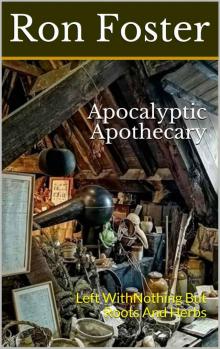 Apocalyptic Apothecary
Apocalyptic Apothecary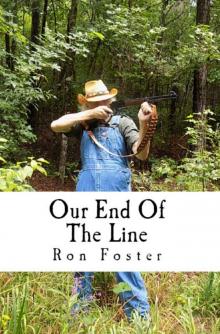 Our End Of The Line
Our End Of The Line Fades The Light: The Prepper Reconstruction
Fades The Light: The Prepper Reconstruction Clem's Contrivance: Terrorist Fiction In The Deep South (The Apocalyptic Rifle Book 1)
Clem's Contrivance: Terrorist Fiction In The Deep South (The Apocalyptic Rifle Book 1) Diary Of A Kudzu Salesman: Survival And Recovery After The Electrical Grid Collapse (Prepper Reconstruction Book 2)
Diary Of A Kudzu Salesman: Survival And Recovery After The Electrical Grid Collapse (Prepper Reconstruction Book 2) The Ridiculously Simple Survival Book
The Ridiculously Simple Survival Book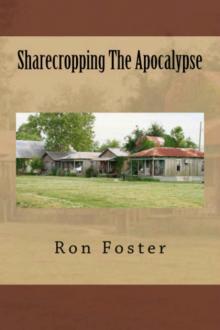 Sharecropping The Apocalypse: A Prepper is Cast Adrift
Sharecropping The Apocalypse: A Prepper is Cast Adrift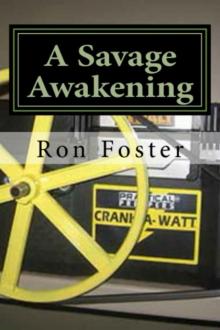 The Savage Awakening (A preppers Perspective)
The Savage Awakening (A preppers Perspective)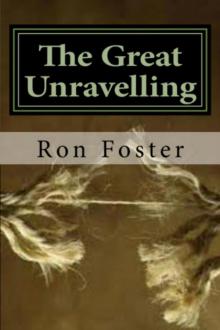 The Great Unraveling (A Preppers Perspective Book 1)
The Great Unraveling (A Preppers Perspective Book 1)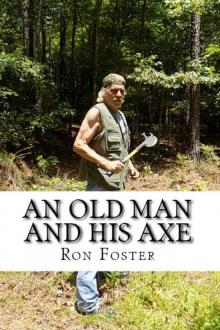 An Old Man And His Axe: A Prepper fiction book of survival in an EMP grid down post apocalyptic world (Old Preppers Die Hard 1)
An Old Man And His Axe: A Prepper fiction book of survival in an EMP grid down post apocalyptic world (Old Preppers Die Hard 1) Shadows Of Sanity And Survival (Old Preppers Die Hard Book 3)
Shadows Of Sanity And Survival (Old Preppers Die Hard Book 3)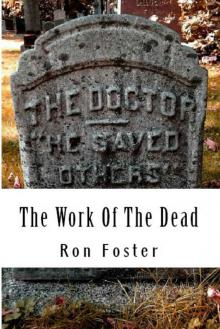 The Work Of The Dead: A Post Apocalyptic Prepper Fiction Series (Aftermath Survival Book 1)
The Work Of The Dead: A Post Apocalyptic Prepper Fiction Series (Aftermath Survival Book 1)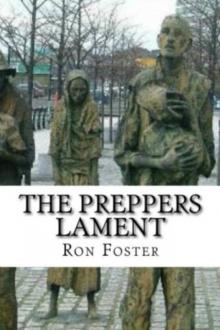 The Preppers Lament
The Preppers Lament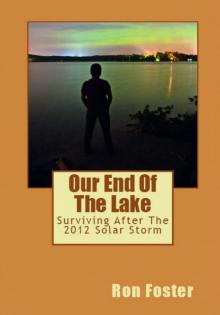 Our End Of The Lake: Surviving After The 2012 Solar Storm (Prepper Trilogy)
Our End Of The Lake: Surviving After The 2012 Solar Storm (Prepper Trilogy)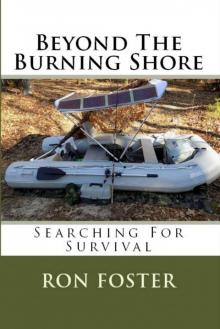 Beyond The Burning Shore: Searching For Survival
Beyond The Burning Shore: Searching For Survival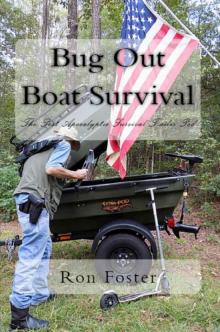 Bug Out Boat Survival: The Post Apocalyptic Survival Trailer Pod (Aftermath Survival Book 3)
Bug Out Boat Survival: The Post Apocalyptic Survival Trailer Pod (Aftermath Survival Book 3)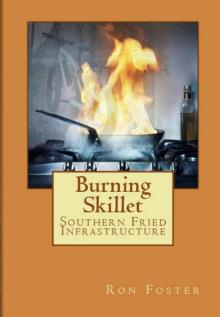 Burning Skillet: Southern Fried Infrastructure (Grid Down Prepper Up Book 2)
Burning Skillet: Southern Fried Infrastructure (Grid Down Prepper Up Book 2) The Solitary Man’s Refuge
The Solitary Man’s Refuge A Pox Upon Us
A Pox Upon Us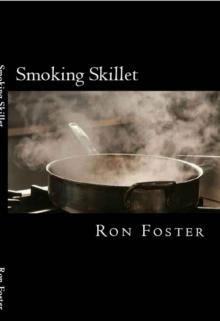 Smoking Skillet
Smoking Skillet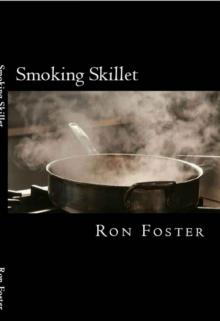 Smoking Skillet: A Recipe For Societal Collapse
Smoking Skillet: A Recipe For Societal Collapse Empty Aisles & Empty Hearts (Preppers Perspective Book 3)
Empty Aisles & Empty Hearts (Preppers Perspective Book 3)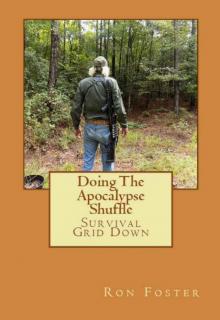 Doing The Apocalypse Shuffle: Southern Prepper Adventure Fiction of Survival Grid Down (Old Preppers Die Hard Book 2)
Doing The Apocalypse Shuffle: Southern Prepper Adventure Fiction of Survival Grid Down (Old Preppers Die Hard Book 2)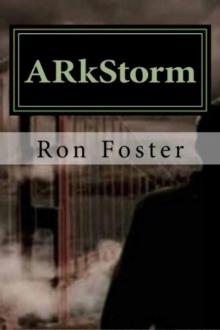 ARkStorm: Surviving A Flood Of Biblical Proportions
ARkStorm: Surviving A Flood Of Biblical Proportions